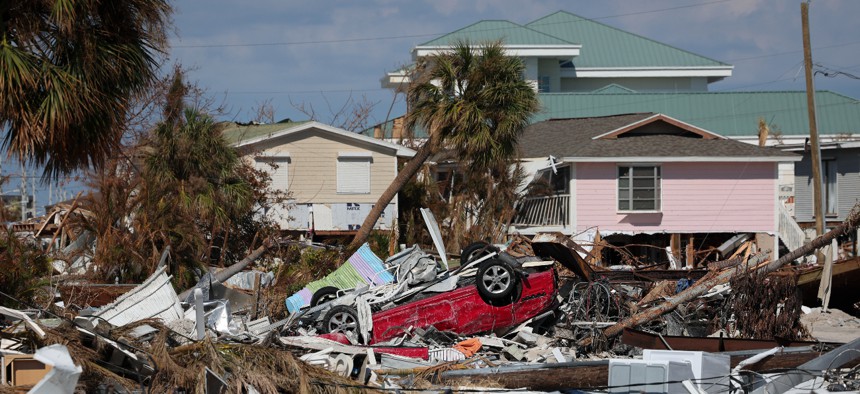
Destruction left behind in the wake of Hurricane Ian is shown Oct. 04, 2022 in Fort Myers Beach, Fla. Southwest Florida suffered severe damage during the Category 4 hurricane which caused extensive damage to communities along the state's coast. Win McNamee/Getty Images
OPM Authorizes Emergency Hiring for Hurricane Response
The federal government’s HR agency also reminded agencies of the variety of categories of leave available to federal workers impacted by a pair of recent severe storms.
The Office of Personnel Management last week announced that it is authorizing the emergency hiring of temporary federal employees to help respond to a pair of hurricanes that struck portions of the United States in recent weeks.
Last month, Hurricane Fiona made landfall in Puerto Rico as a Category 4 storm, killing 21 people and knocking out power for the entire island. And Hurricane Ian, also a Category 4 storm, struck the west coast of Florida, killing more than 100 people and causing widespread flooding and power outages.
In a memo to agency heads on Friday, OPM Director Kiran Ahuja authorized agencies to make use of emergency hiring authorities for temporary staff needed for recovery and relief efforts associated with the two storms. Under the authority, agencies may quickly hire temporary employees outside of the competitive hiring process into the excepted service for up to one year with the option to extend their service by an additional year, and the employees must be “directly involved” in hurricane recovery work.
Although many of the requirements associated with the traditional hiring process do not apply in emergency hiring, agencies still must apply the provisions of veterans’ preference when filling positions. And Ahuja encouraged agencies to publicly advertise their recruitment efforts, even though it is not required under the expedited hiring authority.
Employees hired under this authority may become entitled to federal employees’ health benefits, including the Federal Employees Health Benefits Program and the Federal Employees Dental and Vision Insurance Program, as well as access to paid annual and sick leave if they are on the job for at least 90 days. But none of these temporary employees are eligible to participate in the Thrift Savings Plan, other retirement benefits or life insurance.

In a separate memo last week, Ahuja also highlighted the array of leave and other workplace flexibilities available to existing federal workers who have been impacted by extreme weather and other emergencies.
Agencies may provide weather and safety leave—paid time off typically during or in the immediate aftermath of an emergency—whenever agencies have determined it is unsafe for federal workers to travel to their typical work site. Weather and safety leave often does not apply to employees who are capable of teleworking, although there are some exceptions, such as in the event of power or internet outages, Ahuja wrote.
“Even if the individual is not prevented from safely traveling to and working at their approved telework site during severe weather or other emergency situations, OPM regulations allow for certain other exceptions that may warrant approval of weather and safety leave," she wrote. “Agencies may provide weather and safety leave to a telework program participant if, in the agency’s judgment, the employee could not have reasonably anticipated the severe weather or emergency and thus is not prepared to telework. Additionally, agencies may provide weather and safety leave to a telework program participant if the employee is prepared to work at a telework site but is prevented from safely working there due to the severe weather or emergency situation.”
In the weeks after a severe weather event or other emergency situation, federal workers impacted by the event can often receive donated paid leave from their coworkers through an emergency leave transfer program. Although OPM has already authorized a leave transfer program for Hurricane Fiona, it is still “assessing the need” for establishing a separate program for areas impacted by Hurricane Ian.
Ahuja stressed that federal workers who need time off to recover from Ian should take time off by requested advanced—not already accrued—annual or sick leave or by taking leave without pay so that they can substitute in donated leave once a leave transfer program is authorized.
“Please note that the ELTP regulations provide that annual leave donated under an ELTP may be substituted only for advanced annual or sick leave or LWOP used because of the emergency,” she wrote. “This is very important, because if an ELTP is later established, employees will not be able to retroactively substitute donated annual leave for any accrued annual or sick leave they used because of the adverse effects of the disaster or emergency.”







